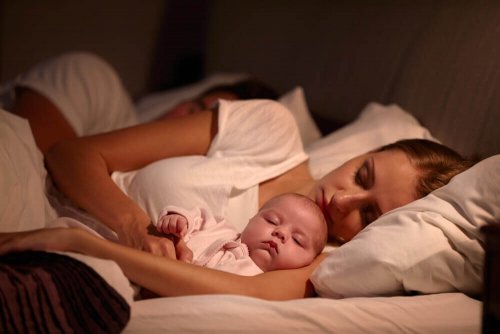Why Babies Sleep Best Next to Their Mothers

“Why does my baby sleep only when he’s next to me?” many new mothers ask, tearful and tired after several nights of poor sleep. The answer is simple. It’s natural: babies sleep best when they’re close to their mother.
After spending nine months embraced and supported inside of her body, they fell asleep and woke up listening to their mother’s heart beat.
Why do we think it would be any different after birth?
It’s Normal for Babies to Sleep Better Next to Their Mothers
Babies need and seek physical contact to feel calm and protected, just like when they were in the womb. They need it while they’re awake, to fall asleep and while they sleep and when they wake up again.
This was how it was during pregnancy and how it will be for a while longer.
First, because babies have to get used to living outside of the womb. Then, their sleep patterns won’t be regular until they’re 5 or 6 years old.
Do not miss: Should you Wake Your Baby for Feedings?

However, some parents believe that from the time they are born they should sleep in their own crib in their own room. Others take the crib into their room for 4 to 5 months, but no more.
Unfortunately, however, this doesn’t help the baby to sleep. Babies only sleep if they’re close to their mother because that’s the only thing they know.
Co-sleeping is an Option
Getting their baby to sleep properly is the most common concern of new mothers.
While they’re searching for “magic recipes” to get them to sleep longer or to get them to fall asleep alone after waking up, they miss the easiest solution: co-sleeping.
For generations in many cultures, children have slept with their parents, and their parents with their grandparents. Sometimes, they’ve slept sharing the same room, most of the time in the same bed.
Cohabitation is still practiced by many parents regardless of social class, cultural customs or their country of origin.

Between 1980 and 1990, Ferber and Lozoff’s theory became known.
A lot of doctors, psychiatrists and specialists supported the idea of leaving your baby to sleep alone, but they forgot that babies are mammals. Like every being that’s breastfed by its mother, babies only fall asleep if they are close to their mother.
While breastfeeding and cradling them, they listen to his mother’s heart, smell her nearby, and fall asleep.
Also read: Is it true that breastfeeding helps you lose weight?
Sleeping Near Mother

Many attribute a baby’s sleep problems to their parents. They claim that the parents’ activities will keep the baby awake.
However, that’s not the case.
Pregnant women walk, go up and down stairs, drive cars, dance, have sex and exercise. Even with pregnancies that require total rest, the baby hears and feels his mother.
All that movement and all those sounds accompany babies while they sleep in the womb, which is nothing like sleeping alone in a crib in a silent room.
It’s Only Natural
There are some babies who only fall asleep when they are close to their mothers, because it’s natural.
But many still insist on leaving them alone in their cribs. To keep them from crying and sleeping poorly – as well as for you and your partner – make it easy and keep your baby close to you.
Although many of us had our parents and grandparents sleep with us, instead of just doing the same, it’s time to trust our hearts and what our baby wants.
All cited sources were thoroughly reviewed by our team to ensure their quality, reliability, currency, and validity. The bibliography of this article was considered reliable and of academic or scientific accuracy.
- Rocío Sánchez-Carpintero Abad. (2008). Trastornos del sueño en la niñez. Protocolos de Neurología.
- Velayos Jorge, J. L., Moleres, F. J., Irujo, A. M., Yllanes, D., & Paternain, B. (2007). Bases anatómicas del sueño. Anales Del Sistema Sanitario de Navarra.
- Izzedin-Bouquet, R. (2009). El método de observación de bebés de Esther Bick. Perinatol Reprod Hum.
- VV.AA. (2017). El colecho en nuestro medio: estudio de casos y controles en las consultas pediátricas de Atención Primaria. http://scielo.isciii.es/scielo.php?script=sci_arttext&pid=S1139-76322017000100003
This text is provided for informational purposes only and does not replace consultation with a professional. If in doubt, consult your specialist.








